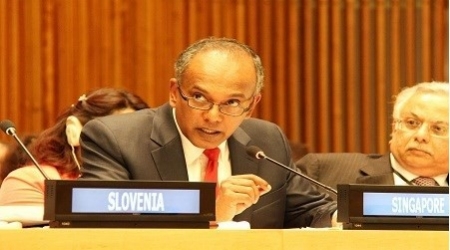Transcript of Statement by Minister for Foreign Affairs and Minister for Law K Shanmugam at the High-Level Side Event at the 69th Session of the United Nations General Assembly "Moving Away from the Death Penalty: National Leadership", 25 September 2014
-
26 September 2014
Minister K Shanmugam delivering remarks at the High-Level Side Event at the 69th Session of the United Nations General Assembly. [Photo: MFA]Mr Chairman, Excellencies, We agree with the sentiments ...
This article has been migrated from an earlier version of the site and may display formatting inconsistencies.

Minister K Shanmugam delivering remarks at the High-Level Side Event at the 69th Session of the United Nations General Assembly. [Photo: MFA]
Mr Chairman,
Excellencies,
We agree with the sentiments that you have expressed. However, I think there needs to be a more careful assessment of the facts and the different situations in different countries. The approach of a sweeping statement that can apply to all is counterproductive.
Let me share with you, in this context, Singapore’s experience, where the death penalty is targeted at drug traffickers.
There are major drug trafficking centres in the region: Afghanistan, Southeast Asia, amongst others. Drug production and transportation is now a major sophisticated multi-national corporation activity run by cold, calculating, ruthless operators who trade the lives of their victims for profit. Millions of drug victims in our region. We would be a natural front for drugs to come in on a large scale, because we are a wealthy city-state with lots of young people and a major logistics hub, from where drugs can be easily distributed throughout the world, from Singapore. If you look at major cities in developed countries, you will find entire neighbourhoods that have been destroyed by drugs and drug-related activities, including theft. Entire lives and generations, destroyed. Young people born in such slums have no access to education and the drug culture completely prevents them from having meaningful human existence.
Globally, drug use kills between 100,000-250,000 people, mostly young people. Singapore is probably either the only country, or one of the few countries in the world, which has successfully fought this drug problem. For those who ask for whom the death penalty can be a deterrent, I say to them, come and see for yourself in Singapore, and compare the region and the rest of the world.
Death penalty for traffickers, in our experience, has been an effective deterrent, as part of a framework of laws, coupled with effective enforcement based on rule of law. Drug traffickers stay out of Singapore now, largely, because of the knowledge: first, that there is a highly professional and incorruptible police force and there is a high probability that they will get caught; and second, there is rule of law, an independent judiciary and a high probability that, based on the laws, they will face the death penalty. So we do not have slums, ghettoes, no-go zones for the police, or syringes in our playgrounds.
People know the story of Singapore – a story based on rule of law, human development, quality of life – that can be compared to the experience of any country around this table or any other table. You can send your 10-year old child on public transport at any time of the day and night and not have to worry whether your child will return.
One of the main reasons that our society is probably one of the safest in the world is that we take a very tough approach on drugs. If a drug trafficker traffics in a quantity which can supply 300 drug abusers for a week, he could face the death penalty. This is not revenge; this is not vengeance. This is based on the principle of deterrence and clear rule of law.
We see a lot of focus on people who face the death penalty but you don’t see enough focus on their victims.
Drug traffickers impose immense penalties, including the death penalty, on their victims. Thousands of people die. We have stopped that in Singapore. We want to protect our people from becoming victims, and to protect our society.
This debate often proceeds on generalised statements and ideology. If we want to make progress, I suggest we engage in a discussion that looks at facts; focusing, among other things, on the victims of the drug trade. And the nexus between the drug trafficker and his thousands of victims.
Let’s move away from rhetoric and let’s focus on facts. To portray the debate as one of taking lives versus not taking lives is a straw man argument.
No civilised society can glorify in the taking of life. The question is whether, in very limited circumstances, it is legitimate to have the death penalty so that the larger interest of society is served. We imposed the death penalty in relation to drug trafficking and our laws provide for the death penalty in a limited number of other offences.
Thank you.
. . . . .
